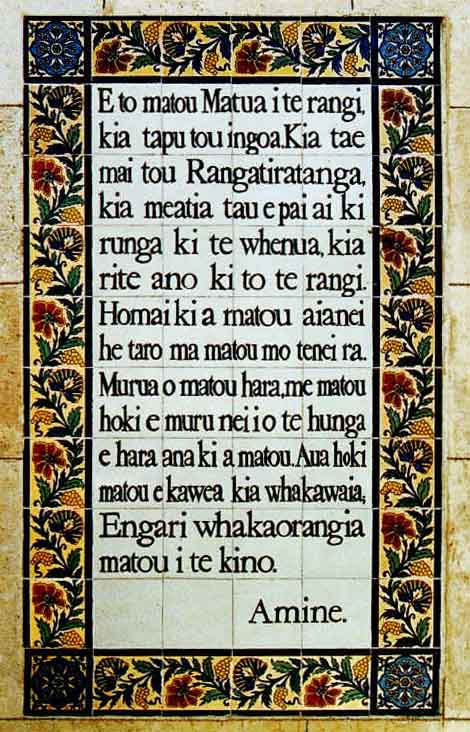
|
| E to matou Matua1
i te rangi Kia tapu2 tou Ingoa3 Kia tae mai tou rangatira-tanga4. Kia meatia5 tau e pai ai ki runga ki te whenua, kia rite ano ki to te rangi. |
Our
Parent in the spirit world |
| Homai ki a matou
aianei he taro6 ma matou mo tenei ra. Murua7 o matou hara Me matou hoki e muru nei i o te hunga8 e hara ana ki a matou. Aua hoki matou e kawea kia whaka-waia;9 |
Give
us now the food we need this day. . Strip us of our sins; Give us back what we have lost; so that we, the slaves of sin, may be with you again. Do not lead us into temptation; |
| Engari whaka-orangia10
matou, i te kino: Nou hoki te rangatira-tanga, te kaha, me te kororia, Ake, ake, ake. Amine. |
May
we be whole, away from things evil; |
|
1. Matua |
Matua in Maori is a much bigger word than Father. It means parent - female as well as a male, suggesting the caring, loving, disciplining, helping, protecting aspect of God. |
|
2. Tapu |
Many Maori, and also Pakeha, non-Maori of generally European descent, regard tapu as meaning forbidden. But is also descriptive of reverence, respect, honour. |
|
3. Ingoa |
Ingoa, meaning name, is very important to many people of all races, and here it reflects the special and important character of God. |
|
4. Rangatira-tanga |
Rangatiratanga - the chiefly rule of a rangatira. To many Maori, rangatira means the chief, the boss, the big one. But in Maori society rangatira implies responsible leadership, guidance, education and nurture of the people. Rangatiratanga suggests a God who cares and protects, and to whom consequently there is loyalty as part of a relationship. |
|
5. Kia meatia ... |
The phrase Kia meatia is idiomatic, often used instead of other specific descriptive phrases. Meatia is the passive form of the verb mea, do, or deal with. So Kia meatia means May it be done, May it be dealt with. |
|
6. Taro |
Taro is widely used in tropical Polynesia as an equivalent to bread, and here describes food that is useful to the Maori in many situations. It is the food of life, a metaphor for everything needed for human life. |
|
7. Murua |
Muru, the active voice of the murua, recalls an ancient Maori practice whereby upon a person's death his or her contemporaries would descend upon the deceased's house and strip it of everything it contained. In effect the Maori prayer says Come muru us; seize us and take away everything bad; our sins, all that has gone wrong; all that will stop us being with you, God. |
|
8. Hunga |
Hunga are those without status - commoners, vassels, slaves. In older Polynesian usage, this word had connotations of an insignificant particle of anything; a crumb; fine rain drops, discarded flax threads. |
|
9. Whaka-waia. |
Whakawhia is tempation or enticement. This is an 1830s Maori version of the old English prayer-line Lead us not into temptation which has always created problems and arguments among Biblical scholars. The scholars now give us Save us from the time of trial. |
|
10. Whaka-ora-ngia
|
The English prayer-line Deliver us from evil has been expanded in the Maori. Whaka-ora-ngia includes the word ora, life, health, wellbeing, happiness, and it suggests peace, salvation and wholeness. |
|
|
|
| E Te Ariki
Whakarongo mai ra kia matou E Te Ariki Titiro mai ra kia matou Te Matua o tamariki E whakapono ana matou kia Koe Aue Aue Te Matua Te Tamati Wairua Tapu E | Lord
listen to us Lord watch over us Father of us children we believe in You Indeed The Father, Son and Holy Spirit |
1997 CD, Te Matapihi, Gateway to the past - window to the future.
1999 CD.Hato Paora, 50 years on.Both of these choirs were conducted by Morvin Simon.
Possibly he composed the tune used in these recordings.

Kiwi Songs - Maori songs - Home
Published on the web March 2006